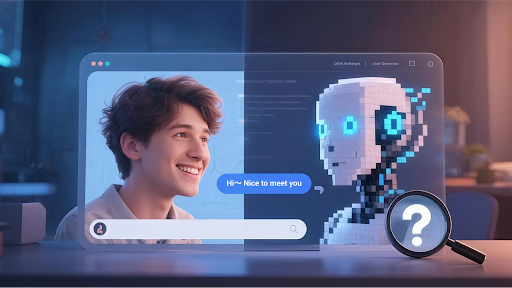
Ivy, an office worker, curls up on her couch one quiet evening after work. She opens a chat application and types a brief account of her challenging day. Almost immediately, a message appears: “It is natural to feel disappointed, but remember that each experience adds to the strength you will carry into the next challenge.” The words feel attentive and almost tender. Ivy suddenly wonders whether she is speaking to a machine or if a human is secretly reading her messages.
She is not alone in this uncertainty. As AI chat software becomes more sophisticated, users increasingly question whether the warmth they encounter online could only come from a human. If it were a person, they ask, what would it mean for their privacy?
The Question of Trust
“I once mentioned that I had failed a job interview,” Ivy recalls. “The AI seemed to remember details from earlier conversations and encouraged me to learn from the experience. I stopped and thought that this feels too human to be AI.”
Jason, a technology enthusiast, shares a similar concern. “At first, I enjoyed the smooth flow of AI chats. Over time, I started to worry. If a real human is behind these messages, then I have no privacy at all. My personal thoughts and family details could be exposed.”
As AI conversations become more natural, users may feel comfort at first, but this can shift to unease as concerns about personal data safety grow. Privacy is no longer optional; it is essential for trust.
Privacy Protection in AI Chat Software
When people share their feelings with a virtual companion, they seek both empathy and safety. Conversations that risk exposure quickly erode trust. Privacy protection has become the defining factor for long-term user loyalty in AI chat software.
The emerging platform Flipped Chat prioritizes privacy in its design. All conversations are used only to generate immediate responses. Messages are encrypted during transmission and storage, never reviewed by humans, and can be deleted by users at any time. This level of transparency reassures users, allowing them to share daily details and deeper emotions without fear.
Why AI Conversations Feel Human
AI chat systems generate responses using large language models trained on vast amounts of text. When a user types a message, the system predicts the most contextually appropriate reply. Repeated over multiple interactions, these responses create coherent, seemingly attentive dialogue.
The effect is amplified by anthropomorphism, the human tendency to attribute human traits to non-human entities. Psychologists Epley, Waytz, and Cacioppo outlined a three-factor theory of anthropomorphism in 2007. They found that people are more likely to perceive non-human agents as human when they have social needs, observe human-like qualities, and are motivated to understand and predict behavior.
AI chat software often meets these conditions. Users seek emotional connection, the AI responds in human-like language, and interactions often occur during moments of stress or isolation. The result is an experience that feels empathetic and personal.
Earlier research also supports this phenomenon. In 2000, Clifford Nass and Youngme Moon introduced the Computers Are Social Actors theory. Their findings showed that humans instinctively respond socially when technology exhibits social cues. When AI demonstrates empathy and attentiveness, users naturally treat it as human.
How to Distinguish AI from Humans
Even with increasing realism, some signs can help users identify AI:
Consistency of tone and logic: AI maintains a uniform style, whereas humans often shift tone or opinion.
Handling ambiguity: Humans may share personal reflections when faced with vague questions, while AI gives neutral and balanced answers.
Emotional steadiness: Humans show fatigue or impatience, while AI remains polite and patient.
Understanding these clues helps users interact with AI while maintaining perspective.
Tips for Users
Users of AI chat software should consider the following:
Choose platforms that prioritize privacy. Read privacy policies and ensure you control your data.
Avoid over-reliance. AI can provide companionship but should not replace professional counseling or real human connections.
View realism with perspective. The lifelike quality of AI is the result of algorithms, not human emotion.
The Bigger Picture
AI chat software attracts users by mimicking warmth through code. The potential risk lies in forgetting that the warmth is simulated. Questions about human involvement and privacy are healthy and necessary. They push developers to value transparency and user trust.
Flipped Chat demonstrates that privacy and trust are fundamental to user adoption. As AI becomes more convincing and emotionally intelligent, one reassurance remains critical: the responses users receive come from algorithms designed to respect privacy, not from hidden human monitors.
Ultimately, the paradox of AI companionship is clear. The more we perceive AI as human, the more we must insist it protects what makes us human—our trust.







